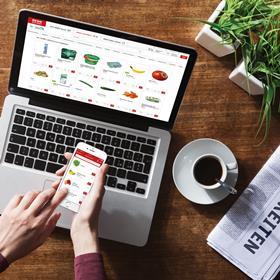
At first glance, the concept “personalised nutrition” might seem like a tautology, another buzzword for an industry that revels in neologisms. All nutrition is, after all, personal. But don’t let the term fool you – a real movement is taking place in the way shoppers will select their food in the not-too-distant future.
“Generic public health messages are not working,” states Barbara Bray in her recent Nuffield scholarship report, titled ‘Vegetable production for specific nutritional need’ (see page 14). Indeed, one of the big downsides of the growth in food choice and dietary science has been widespread confusion, bordering at times on hysteria, as to how and what we should eat. From Palaeolithic diets to fruitarians, people feel less secure than ever in what we pick off the shelves.
Increasingly, people are turning to tools that can create bespoke, gene-based nutritional plans for their specific dietary needs. Personalised nutrition is perhaps a fight back against confusion, by bringing together the latest nutritional science with new technology and nutritional understanding.
Mariette Abrahams runs a consultancy, itself tailored to the expansion of personalised nutrition, which she says aims to bridge the gap between nutrition, research, new technology and frontline nutrition experts.
“There is currently no set definition of personalised nutrition. I would define personalised nutrition as the tailoring of nutritional and lifestyle recommendations that match an individual’s health goals, preferences, values and beliefs,” Abrahams says.
In her report Bray adds that personalised nutrition is “a staged process where an individual shares information with another party to have tailored nutritional advice,” saying it has developed over the past 60 years on the premise that using an individual’s genomic information can help combat chronic diseases through certain diets.
Today personalised nutrition can take on different forms, whether through a phone app, or as Waitrose did last year, introducing in-store nutritionists to help customers make more bespoke food choices. Dominic Blakemore, chief executive of the world’s largest foodservice company Compass Group, painted a more radical picture at this year’s City Food Lecture in February.
“It is possible we will all have a ‘digital self’ who knows more about us than we do today,” Blakemore said. “It understands our general preferences and how these change depending on the environment, climate or mood and will be able to forward predict how we are likely to behave tomorrow, next week and beyond. Most likely, all of our medical and dietary information will be programmed along with our taste preferences so our digital self is likely to deal with any food-related decisions based on multiple data inputs, and be able to forward predict these too. Amazon’s Alexa is already capturing preference data just by listening.”
But whichever form it takes, personalised nutrition remains about matching up the right foods for individual needs, and it is perhaps that personalised approach which makes it more effective than generic campaigns. “While it is not mainstream as yet, I am confident that it will become so, as healthcare systems across the world are struggling to cope with the epidemic of preventable lifestyle diseases,” Abrahams says.
Waitrose is one of the retailers leading the way in personalised nutrition, recently partnering with Imperial University tech startup DnaNudge, which has created a wearable wristband containing your genetic makeup, that can scan product barcodes to give it the proverbial thumbs up or not.
“Many of our customers are looking for this and, by offering them the chance to take part in the study, they can make more informed decisions based on their own DNA and, in doing so, also contribute to developments in this important area,” Waitrose stated.
But how much would this really impact fruit and vegetable sales, when however your genes turn, they are the undisputed basis of a healthy diet? “There is a lot of work to be done to help in terms of behaviour change,” says Abrahams. “For instance, consumers who are concerned about sustainability and carbon footprint. This means that the sector can incentivise consumers to buy from local growers, and make it easy for consumers to find out more about how the produce has been grown.
“In addition, fruit and vegetables contain a variety of different micro and phytonutrients, these health benefits should be communicated. For particular groups who are at an increased risk of cardiovascular disease, diabetes or stroke, just as an example, the consumption of fresh produce should be highlighted as there is plenty of research to substantiate this,” Abrahams says.
As personalised nutrition begins to change the way we shop, inevitably fresh produce companies, which are also becoming increasingly brand aware, will have to personalise their marketing strategies too. Abrahams points out that with health and grocery shopping both going increasingly online, it’s only a matter of time before the two come together.
“With a rapid rise in e-commerce, the fresh produce sector could team up with food delivery companies such as Deliveroo or HelloFresh and other brands to offer their produce directly to the consumer and focus on the benefits in terms of freshness and low carbon footprint.”
Bray likewise suggests that personalised nutrition could herald an increased role for fruit and veg growers in public health. “Future initiatives need to look at partnerships between the public and private sectors; for example, the integration of a personalised nutrition service into the public health sector but the provision of the prescribed food by the private sector, retail and foodservice,” Bray says.
Abrahams’ conclusion echoes Bray’s. “I would propose that producers get involved in programmes where the education and consumption of fruit and veg can be incentivised and researched at the same time. This will help in understanding behaviour and barriers to adoption, which can be addressed via marketing or even specific (digital) rewards. Producers and manufacturers could work with nutrition experts to develop resources, recipes and videos to highlight nutritional benefits and make consumption in everyday life easy.”



